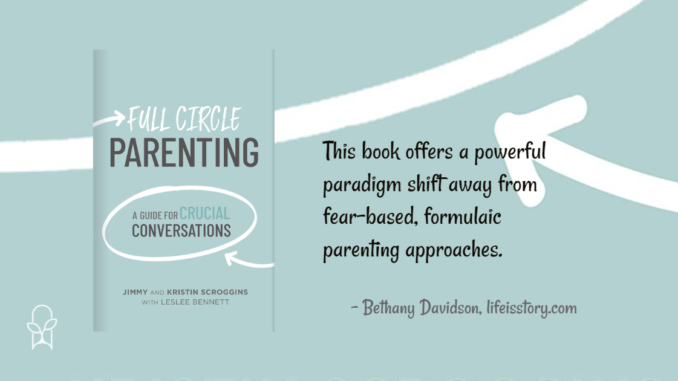
Published by B&H Publishing on April 20, 2021
Genres: Non-Fiction, Christian Life, Parenting
Buy on Amazon
Goodreads

Parenting isn’t for wimps.
It's not just the routines, schedules, discipline, and heartaches—it's the hard conversations. One of the greatest challenges of parenting is navigating the crucial conversations that we must have with our kids.
Jimmy and Kristin Scroggins have been married for more than twenty five years and have eight children. Jimmy pastors a church in South Florida. They’ve had plenty of crucial conversations in their lives—not only with their own children, but with parents who are scared and seeking wisdom. They know they have to find a way to have those tough conversations from a biblical perspective and a distinctly Christian worldview, but they don’t know how.
If you’re like these parents, Full Circle Parenting was written for you. Using the 3 Circles gospel tool (God’s design; brokenness; gospel), Jimmy and Kristin will give you a “conversation map” to work through any tough conversations you have with your children, and will show you how it works with the following topics and more:
Gender, Sexuality, and Marriage
Technology
Alcohol and Substance Abuse
Bitterness, Forgiveness, and Restoration
Friendship and Mean Kids
In this refreshingly realistic book, Jimmy and Kristin Scroggins explain why formulaic approaches to parenting almost always end in disappointment and frustration, and they provide an adaptable, big-picture alternative. Instead of promoting a specific formula, they take a conversation-based approach to issues, showing how parents can apply the “three circles” of the gospel (God’s design, brokenness, and redemption) to a variety of different issues that families face. They share anecdotes from their own family life, explain Scriptural principles and passages, and provide example conversations to model how parents can discuss some major, complex issues with their children.
General Approach
Full Circle Parenting: A Guide for Crucial Conversations is especially powerful because of the authors’ understanding of how complex people are. In addition to talking about how individual children’s personalities and needs vary, they also address children’s complex behavior, explaining that with their own children, they often wondered which version of a child was their “real kid.” One of their kids was passionate for missions and a compulsive liar, and honoring complexity meant seeing the child as a whole, rather than thinking that one side of the child was fake. They encourage parents to recognize their children’s and their own complexity, to build strong relational bridges, and to surround their children with other mature leaders and mentors who will support the family along the way.
The Scroggins do a great job of sharing specific, personal examples while also honoring their children’s privacy. They have eight children, which makes it easier to maintain each one’s anonymity, but I admire how they shared humbling, real-life struggles without publicly shaming their kids. The Scroggins write with sensitivity to their children’s complexity and life struggles, and through their honesty, they show other parents that yes, your kids will do foolish, sinful, and destructive things at times, and it’s okay to be honest with yourself and the church about the struggles that you’re facing. They never pretend to have it all together, and also write with sensitivity to blended families, single parent families, and parents with dysfunctional pasts.
Practical Concerns
The chapters on major life issues cover gender, sexuality, and marriage, technology, alcohol, and substance abuse, bitterness, forgiveness, and restoration, and friendship and mean kids. Each chapter is realistic, calm, and matter-of-fact, and the Scroggins share practical ideas for navigating tough conversations and situations. I especially appreciated the chapter about resentment and forgiveness, because they address emotional struggles with deep sensitivity and establish clear guardrails for what forgiveness does not mean. They make it clear that forgiveness is “both an event and a process,” and that it does not require remaining vulnerable to someone or releasing them from the “social, relational, financial, or legal ramifications of their actions.” However, even though I expected the chapter about friendship and mean kids to be just as clear and helpful, I found it disappointing.
That chapter mostly focuses on sibling relationships, and even though it includes great advice for big families, this should have been a separate chapter. It majorly cuts into the material about friendships outside the home, and the part about dealing with mean kids is very weak. The Scroggins share their guidelines for their sons about when and how to escalate to physical aggression to make someone back down, but even though they acknowledge other parents’ misgivings and say that they would never advise this for their girls, they never follow up with an alternative plan. The chapter ends soon after this, without any concrete advice for how kids can deal with emotional and relational mistreatment. Since bullying is such a huge issue, I was surprised and disappointed that the chapter didn’t address dynamics for girls or provide a sample plan for dealing with conflict and bullying in a non-physical way.
Conclusion
The best thing about Full Circle Parenting is the paradigm shift that it offers. The Scroggins equip parents to leave behind fear-based, formulaic parenting approaches, and instead of promising God’s blessing or success for a particular methodology, they show parents how they can apply the concepts of the gospel to daily life, seeking God’s design and pursuing redemption for our real-life, inevitable brokenness. This book reassures parents that every family is messed up at some level, that a child’s bad behavior doesn’t necessarily reflect on their parents or guarantee a bad future, and that parents can respond to tense, overwhelming issues through a reliable gospel lens. Even when parents disagree with the Scroggins’ particular examples or practical suggestions, they can derive the necessary conversation tools from this book to become more thoughtful, compassionate, and persuasive in their specific context.
